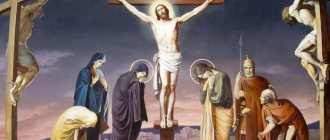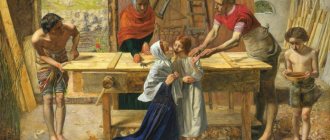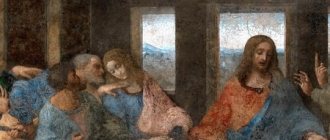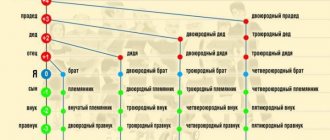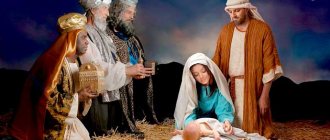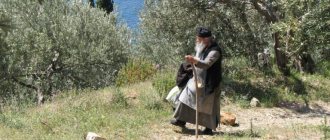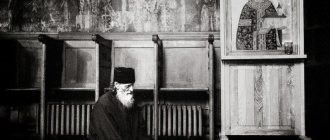When Jesus Christ was crucified, two robbers were executed along with him. Their names were Gestas and Dismas. More famous in history is the criminal Barrabas, who was also supposed to be executed on this day, but was pardoned by Pontius Pilate on the occasion of Easter. But the bandits who died next to the Savior are not so well known.
Photo: School.orthpatr.ru
Gestas (mad robber)
- In the Gospel of Luke, Gestas is referred to as a mad robber. His name becomes known from the apocryphal Gospel of Nicodemus, which was created in the 4th century.
- It is mentioned in an apocryphal text of the 6th century in Arabic, dedicated to the childhood of Jesus Christ. In this version, Joseph and the Virgin Mary met two thieves as they walked through the desert. It was Gestas and Titus, who were guarding the camp while their comrades rested. Titus, who did not want to harm the Holy Family, persuaded Gestas not to touch them.
- According to another version, Gestas robbed Joseph when he fled to Egypt. His name is mentioned in a poem in Latin, which in ancient times robbers considered their talisman.
- The Slavic apocrypha “The Tale of the Tree of the Cross,” created in the 15th century, contains a text dedicated to a mad robber crucified on the cross. It mentions that this cross was carved from a tree once planted by Moses near Marah.
Photo: Ru.wikipedia.org
Shortly after the crucifixion, the cross of Gestas was discovered by the mother of the Roman Emperor Constantine I, Helena, who did a lot to spread Christianity. She carried out large-scale excavations in Jerusalem in the 4th century, thanks to which it is believed that the Holy Sepulcher and other holy relics were discovered. Apparently, the Gestas cross was not recognized as a valuable relic; what became of it is unknown.
Gestas embodies the image of an unrepentant sinner destined for hell. It is not known exactly what crime he committed. According to Jewish law, the death penalty was imposed for murder, robbery, robbery, and organizing popular unrest.
About the Baptism of the Prudent Thief
“... the thief received the sprinkling of remission of sins through the sacrament of water and Blood flowing from the side of Christ” (St. Ephraim the Syrian, Creations, vol. 4, p. 434).
“...what was the robber’s justification? He entered heaven because he touched the cross with faith. What happened next? The thief was promised salvation by the Savior; Meanwhile, he did not have time and was not able to realize his faith and be enlightened (by baptism), and yet it was said: “Whoever is not born of water and the Spirit cannot enter the Kingdom of God” (John 3:5), There was no There was no opportunity, no opportunity, nor time for the thief to be baptized, because he was then hanging on the cross. The Savior, however, found a way out of this hopeless situation. Since a man defiled by sins believed in the Savior and needed to be cleansed, Christ arranged it so that after suffering one of the soldiers pierced the side of the Lord with a spear and blood and water flowed out of him; from His side, says the evangelist, “immediately blood and water flowed out” (John 19:34), confirming the truth of His death and prefiguring the sacraments. And blood and water came out - not just flowed out, but with a noise, so that it splashed onto the body of the robber; after all, when water comes out with noise, it produces splashes, and when it flows out slowly, it flows quietly and calmly. But from the rib blood and water came out with a noise, so that they splashed on the thief and with this sprinkling he was baptized, as the apostle says: we came to “Mount Zion and the Blood of sprinkling, which speaks better than Abel” (Heb. 12: 22.24)" (St. John Chrysostom, Complete Collection of Creations in 12 volumes, vol. 8, pp. 694–695).
“Let us listen to Saint Anastasius of Sinaiti, who, about the prudent thief, for whom the water flowing from the side of Christ became the water of baptism, says: “To these birds (that is, to the heavenly spirits) the holy thief flew from the life-giving water that flowed from all birds, soaring through the air in a swarm of birds together with the king - Christ” (St. Demetrius of Rostov, Lives of the Saints, volume January, book 1, Commemoration January 6, Homily on the Epiphany of the Lord, p. 224).
“Therefore, do not doubt, beloved: the grace of God is perfect; the place does not interfere, whether you were baptized here, or on a ship, or on the way. Philip baptized during the journey, Paul - in prison; Christ baptized the thief on the cross from his wound, and he was immediately worthy to open the doors of paradise” (St. John Chrysostom. Vol. 3, Book 2. 4. Sermon on the return of St. John from Asia to Constantinople).
Dismas (prudent robber)
Photo: Ru.wikipedia.org
This criminal is known as the Good or Prudent Robber. Unlike Gestas, he repented of his misdeeds, believed in the Savior, receiving forgiveness from him and a promise to become the first person whose soul would be saved.
In the canonical Gospel, the biographies of the robbers are not mentioned, nor are their names. It is possible to find information about them in numerous apocrypha. These texts claim that Dismas was born into the family of a robber who lived in Egypt. After his birth, the mother became very ill, so she could not feed the baby. When Joseph and Mary fled to Egypt, they were captured by Dismas's father. The Virgin Mary fed the newborn with her breasts for 6 days.
At Golgotha, Dismas was crucified to the right of the Savior. Luke writes in more detail about the crucifixion of the thieves. He notes that according to Christian custom, it is impossible to go to heaven without being baptized. Therefore, it is generally accepted that Dismas was baptized by receiving the blood of the Savior along with water after the warrior Longinus pierced Jesus with a spear.
Nicodemus gives a detailed description of Jesus' visit to hell after crucifixion. This text states that after the crucifixion, Christ descended into the Underworld, crushing its gates to free the souls that were imprisoned in Hell by the devil. After this, the Savior returned to paradise, where he was met by the prophet Elijah, Enoch and Dismas.
Who did the Romans crucify instead of Jesus?
The events surrounding the last days of Isa, the son of Maryam, peace to both of them, on earth are shrouded in mystery. In the four canonized Gospels we read that Jesus was crucified on Calvary, outside the city walls of Jerusalem (Matt. 27:33-38, Mark 15:22-27, Luke 23:33-43, John 19:17-25 ).
The idea of Christ's sacrifice on the cross occupies a central place in Christian doctrine, and apologists of Christianity react painfully to any attempts to question the historicity of Christ's crucifixion. Hence the attitude towards the so-called Gospel of Barnabas, which reports that instead of Jesus, Judas Iscariot was executed, who at the time of his arrest took on the appearance of a Teacher, and Jesus himself was saved by angels and ascended to the third heaven. This document has been known since at least the 16th century and is only partially preserved and its authorship cannot be proven. However, at the Second Vatican Council (1962-1965), the church admitted that the authors of the canonical Gospels are also unknown. In other words, we do not know which church fathers wrote the texts that describe the crucifixion of Jesus, and there is no archaeological or other evidence of this event. Meanwhile, Muslims believe that Prophet Isa was not killed and was not crucified , and let's see what the Holy Quran says about this.
In the Koran, a special place is given to the story of the mother of Jesus - Mary, or Maryam, as she is called in the Koran. It also describes Jesus' virgin birth and birth, his first miracle when he spoke and interceded for his mother while still an infant. Among his other miracles, the meal that Allah sent down from heaven to the apostles of Jesus is mentioned. The Qur'an also speaks of Jesus' ascension to heaven and the controversy surrounding his ascension, and contains references to his second coming to earth. That is, the prophecy of Jesus is considered the most important milestone in the history of mankind and from the point of view of Islam. Prophet Muhammad, peace and blessings of Allah be upon him, also said that there were no other prophets between him and Isa [Abu Dawud 4324].
As for the crucifixion of Christ, we read in the Koran: “But they did not kill him and did not crucify him, but this only appeared to them” (Sura 4 “Women”, verse 157)
. That is, the Koran categorically denies any claims that Jesus was killed or crucified. But what do the words “and it just seemed to them” mean?
Unfortunately, the statements of the Prophet Muhammad, peace and blessings of Allah be upon him, which would shed light on the events of that day, have not reached us. Perhaps he told his companions about this, or perhaps they were content with what had already been said in the Koran, without going into details. There were almost no Christians surrounded by the first Muslims. Many Jews lived next door to them in Medina, but there were almost no Christians, which means there was no controversy about the crucifixion of Christ. And when a delegation of Christians from Najran arrived in Medina, the question of the nature of Christ was discussed, and not about his crucifixion.
Be that as it may, in the absence of prophetic hadiths about what exactly happened that day to the prophet Isa, peace be upon him, commentators on the Quran asked Christian and Jewish scholars with whom they met about this. These traditions are preserved in early Muslim sources and are of great interest for understanding early Christianity.
Thus, Imam at-Tabari in his tafsir gives several versions, and their essence boils down to the fact that when Roman soldiers surrounded the house in which Jesus was with his apostles, Allah changed his appearance, and his appearance was given to another person, whom and the soldiers grabbed him. Some legends say that Jesus’ appearance was given to everyone present in that house at once, while others say that Jesus’ appearance was accepted only by one of the apostles, who voluntarily volunteered to die in the Teacher’s place. Whether it was true or not, we have no clear knowledge of this, and the Koran requires us only to believe that Jesus was not crucified and was not killed. Moreover, the high priests and scribes, who demanded that the Romans execute Jesus, realized that something had not gone the way they wanted. They noticed that the man who was captured by the soldiers had a different build from Jesus. And when he was crucified, they realized that it was not Jesus. The Koran says this: “They were not sure that they were killing him” (Sura 4 “Women”, verse 157)
.
Thus, we know for sure that the Jewish plan was unsuccessful and the Roman soldiers were unable to capture Jesus. Something amazing happened, and instead of the Prophet of Allah, the soldiers captured another person, probably one of his apostles. The Jews realized that something strange had happened, and when the man was killed, they were not sure that it was Jesus. Meanwhile, Allah Almighty ascended Jesus himself to heaven. This was a bodily ascension, but we do not know exactly what state Jesus was in: whether he was asleep or awake. The Koran says in this regard: “O Isa, I will take your soul and lift you to Myself” (Sura 3 “The Family of Imran”, verse 55)
.
And in another place the Koran says through the mouth of the prophet Isa: “And after You took my soul, You watched over them. You are Witness to everything” (Sura 5 “The Meal”, verse 117)
.
The verb tawaffa, which appears in these two verses, was not easy to translate. Many years ago, while working on the translation of tafsir, I agreed with the “put to rest” option proposed by academician I. Yu. Krachkovsky. This is a good option, because depending on the context, the word “put to rest” can take on additional connotations. However, later I abandoned it and translated the verse from the surah “The Family of Imran”: “I will take your soul.” In Russian there is also the word “to finish”, and it is very close in meaning to the verb tawaffa, but is not at all suitable for this context. Therefore, I settled on the option “to take the soul”, especially since in the Koran the verb tawaffa is used in the meaning “to put to sleep” (Sura 6 “Cattle”, verse 60)
, “to kill”
(Sura 6 “Cattle”, verse 61)
, “to take the soul”
(Sura 39 “Crowds”, verse 42)
. That is, the word wafat can mean “death” or “sleep”, and in both cases we are talking about the fact that the Almighty takes away a person’s soul, in whole or in part.
What type of wafat is meant when we talk about the ascension of the prophet Isa? Some commentators believed that it was a dream, that is, Allah put him into sleep and in this state took him to heaven. Others believed that in the verse, “O Jesus, I will take your soul and lift you up to Myself,” there was a deliberate change in the order of words in order to draw attention to the importance of the subject matter. That is, first the prophet Isa was ascended to heaven, and then Allah will take his soul, and this will happen after his second coming.
There is another opinion that does not take into account the semantics of the verb tawaffa. It follows from it that the words إِنِّي مُتَوَفِّيكَ وَرَافِعُكَ إِلَيَّ mean “I will take you and lift you to Myself,” that is, I will simply take you from the earth, without any sleep or death. This opinion was preferred by Imam at-Tabari. But I chose to translate “I will take your soul” because the translation of “I will take you” leaves no room for interpretation. My method of translating the Quran is that if a verse has different interpretations, if early commentators understood it differently, then this should be reflected in the translation. Of course, if it works out. But it doesn’t always work out. And then you have to point out these different opinions in the comments.
